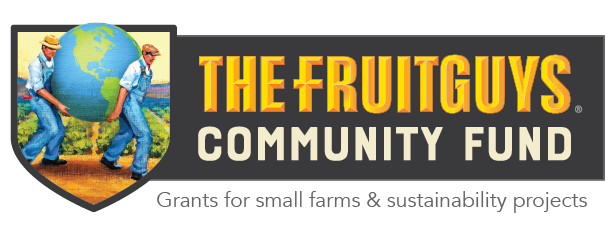
The FruitGuys Community Fund (TFGCF) helps small farms to implement innovative and sustainable farm practices that preserve and enhance the land and the landscape while respecting the farmer’s autonomy and need to make a living.
Our grantee farmers and their farms are key participants in their local ecology, economies, and communities. We fund grant projects for both for profit small farms and nonprofit agricultural organizations, located in the United States, with under 250 acres, that have large positive impacts on the environment, local food webs, and farm diversity.
This Manifesto is a comprehensive list of the sustainable farming practices and farmer impact we seek to promote and support through our annual grant program.
We recommend that farms interested in applying to our grant program review this list.
Sustainable Farming Practices:
Soil
TFGCF supports soil-grown agriculture and good soil management practices, including:
- Using compost, cover cropping, and reduced tillage to build soil fertility and organic matter
- Composting crop wastes on site and/or purchasing and applying locally-made compost
- Keeping the soil covered as much as possible by using appropriate cover crops
- Minimizing tillage in order to keep carbon in the soil and protect soil structure and microbiology
- Conserving soil by applying erosion control measures wherever needed
- Minimizing the quantity of bare soil and the amount of time soil is bare
- Using appropriate erosion control measures to protect waterways and keep soil in the fields
- Sequestering carbon in the soil by increasing soil’s organic matter content over the long term
- Building soil carbon by using compost and/or cover crops
- Retaining soil carbon by minimizing tillage
Water
TFGCF supports good water management practices including:
- Conserving water
- Using the most efficient watering systems for a given crop & soil type (i.e. drip irrigation or micro sprinklers rather than flood irrigation or traditional high-powered sprinklers)
- Protecting water quality
- Using winter cover crops to protect soil from erosion during the rainy season
- Keeping roads, ditches, and culverts in good repair so no road runoff reaches waterways
- Planting filter strips of grasses and shrubs to keep sediment and pollutants out of waterways
- Taking care not to allow chemical drift into ponds, wetlands, or other water resources
- Dealing proactively with water shortages (switching to dry-farmed crops when possible; monitoring groundwater use; water recycling and reuse; increasing water storage)
- Creating opportunities for offstream storage whenever possible
- Designing farmland to slow, sink, and spread water for groundwater recharge by using swales & berms, keyline plowing, or other techniques
Biodiversity
TFGCF supports biodiversity practices including:
- Diversifying the cropping system
- Growing more than one crop
- Incorporating livestock to consume crop wastes, pests, and weeds and to provide on-farm fertility
- Diversifying non-crop areas
- Installing hedgerows, insectaries, and conservation plantings of all types in non-crop areas: along roadsides, fence lines, and “edges and corners” of the property
- Installing habitat for natural enemies of crop pests by creating perennial vegetated areas, and by installing owl boxes, raptor perches, bat boxes, bluebird boxes, etc.
- Restoring and protecting wild areas and critical habitat areas on the farm: upland forests, riparian zones, wetland areas, etc.
- Managing invasive species and keeping them out of wild areas and critical habitat areas
- Providing wildlife corridors by providing safe passage for wildlife and/or connecting wild areas on the farm to surrounding wildlands
Pollination
TFGCF supports good pollinator management practices including:
- Modifying farming practices to protect native pollinators
- Using crop-protection products, if necessary, that are the least toxic to pollinators
- Spraying crop-protection products at times that minimize their impact on pollinators (i.e. at night)
- Avoiding spraying flowering plants whenever possible
- Leaving some areas untilled to provide habitat for ground-nesting native bees
- Creating on-farm pollinator habitats
- Installing hedgerows and insectaries that include plants that flower year-round and that provide good pollen and nectar resources, including in hedgerows plants that are used by cavity-nesting species
- Providing bee boxes and nesting materials for ground- and cavity-nesting species
- Managing honeybee hives on site so that it is unnecessary to bring in hives from offsite that may spread diseases to local bees
- Never spraying insectaries and/or habitat areas
- Participating in the Bee Friendly Farming certificate program. Certifying their farms BFF and using the logo and other materials to educate customers about the importance of farming practices that protect pollinators
Heirlooms
TFGCF supports practices that preserve heirloom varieties including:
- Not using GMOs (genetically modified seeds or organisms)
- Saving seeds from superior varieties and/or individuals for future propagation
- Buying seeds through heirloom seed companies or seed saver’s exchanges
- Using heritage varieties of fruit scion wood for grafting, and making heritage scions available to others when possible
Pests
TFGCF supports good pest management practices including:
- Using non-chemical methods to manage weeds. (i.e. hand weeding, cultivating, mowing, grazing, flaming, mulching, cover cropping and/or intercropping rather than spraying herbicides)
- Creating on-farm habitat for natural enemies/pest predators to be present and thrive so that Ecological Pest Management and Conservation Biocontrol can work to control pests on the property
- Employing natural enemies, such as bats, owls, raptors, snakes, and predatory and parasitic insects, can keep many pests under control
- Using physical barriers to pests, including deer fencing and pest-resistant mesh
- Accepting that a low, non-economically damaging level of pest activity is normal in an agroecosystem, and necessary in order to sustain populations of natural enemies
- Using Integrated Pest Management techniques to determine whether treatment is necessary and choosing the least-toxic treatment technique
- Monitoring for pest presence and pest damage rather than spraying “by the calendar”
- Not spraying a pesticide that destroys natural enemies as well as pests, and can lead to a secondary pest infestation
- Only using chemical solutions when absolutely necessary
- Using the least toxic chemicals and formulations available and in a way that minimizes harm to non-target species
- Avoiding spraying in windy conditions and when pollinators are active
- Avoiding spraying habitat and insectary areas
Climate
TFGCF supports climate-smart farming practices including:
- Recognizing the potential need to change farming practices and/or crops in order to remain successful and productive in the face of a changing climate
- Reducing greenhouse gas emissions by producing and using renewable energy whenever possible (i.e. solar, wind, etc.)
- Reducing fossil fuel use by making investments in energy-efficient structures (i.e. greenhouses, cold storage, etc.)
- Reducing greenhouse gas emissions by minimizing fuel use and using alternative fuels; fertilizing appropriately; and minimizing tillage
- Sequestering carbon in farm soils by applying compost and growing cover crops
- Sequestering carbon in above-ground biomass by planting trees and other perennial plants that store carbon over the long term
Air
TFGCF supports good air quality management practices including:
- Tilling when the soil is at the appropriate moisture level to minimize dust
- Keeping soil covered whenever possible to minimize dust
- Spraying only under appropriate weather conditions to minimize drift
- Planting hedgerows as dust buffers
- Planting trees to sequester atmospheric carbon and promote clean air
Waste
TFGCF supports good waste minimization practices including:
- Reducing waste at all stages of the production cycle
- Using recycled materials whenever possible
- Creating a “closed system” where all on-farm waste is reused through composting or biofuel production
- Reducing the need for off-farm inputs by producing their own fertility, compost, mulch, pollination services, pest management, etc.
Certifications
TFGCF supports third-party certification to verify sustainable farming practices, including:
- Organic certification, under the standards or the National Organics Program of USDA
- Regenerative Organic Certification by Regenerative Organic Alliance/
- Biodynamic certification by Demeter USA
- Bee Friendly Farming certification by Partners for Sustainable Pollination/Xerces Society
- Other reputable specialty-crop certifiers, such as the Stewardship Index for Specialty Crops, the Sustainable Agriculture Standard, or the Food Alliance Certified
Business
TFGCF supports good business practices including:
- Strong record-keeping, including for financials, certifications, employment
- Strategic planning and decision making for farm expansion, sales, and marketing
- Implementing tools and systems to track all business details (crop planning, inventory management, etc.)
- Supporting farms that have been denied traditional access to capital and/or are located in economically-distressed areas
Neighbors
TFGCF supports good neighbor policies including:
- Welcoming customers and visitors to the farm whenever practical
- Educating customers and visitors about sustainable farming practices
- Sharing knowledge, tools, and resources with neighboring farmers
- Helping to show that local, urban-edge farms can be good neighbors
Employment
TFGCF supports good employment policies including:
- Providing a safe and healthy working environment
- Providing year-round employment when possible
- Paying a living wage
- Providing sick leave and health insurance
- Providing basic job-skills training for workers
- Complying with labor laws
Equity
TFGCF supports furthering diversity, equity, and inclusion in agriculture including:
- Equitable access for all communities to healthy, local food systems
- Uplifting historically-marginalized farmers, including women, LGBTQ, disabled, and farmers of color
- Outreach efforts aiming to build relationships with diverse groups
Quality
TFGCF supports practices that produce safe, healthy, and delicious food including:
- Harvesting food at the peak of freshness and distributing it locally
- Producing heirloom & traditional varieties that reflect the local culture & history
- Producing, harvesting, and processing food safely
- Complying with all food safety laws and regulations and advocating for rules that allow for the success of small farms


